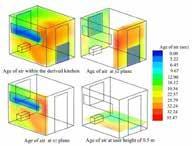
Lack of standardised sustainable habitat design guidelines for low-income housing plays an important role in determining the poor quality of life in these settlements, particularly in the slums. Our work investigates process-driven pathways for developing and delivering sustainable habitat design guidelines using socio-technical frameworks. We employ mixed-mode research methods where we integrate the depth of engineering with the breadth of social science to understand low-income habitat from the perspective of people, places and practices. We combine urban experimentation with robust simulation techniques to derive practical solutions for improving the quality of life (QoL) of the urban poor. Urban experimentation includes data acquisition through in situ environmental sensing of the low-income habitations, modeling of the houses, calibration of the sensed data, and its urban scale building energy calculations using state-of-the art building energy simulation techniques. We integrate the socio-cultural stochastics in building simulation framework to derive empirical evidences of the urban QoL in these settlement. There are three cohorts of reserch:
Investigation of building performance
Spatial analytics for urban sustainability and policy analysis
Data-driven simulation and modelling techniques for derivation of low-income sustainability heuristics.
Prof. Ronita Bardhan
